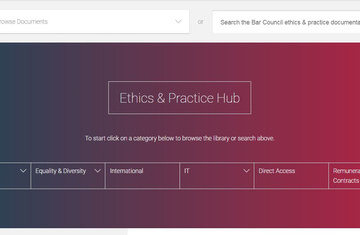The Ethical Enquiries Service
The Bar Council provides a confidential Ethical Enquiries Service to help barristers (and, where appropriate, their clerks and other staff connected with barristers' professional practices) to identify, interpret and comply with their professional obligations under the BSB Handbook.
Call the Ethical Enquiries line on 020 7611 1307. Lines are open 09:15-17:15 Monday-Friday.
You will receive a response to your email within four working days.
Please note: this service does not give legal advice, and we encourage (where possible) members of the Bar to talk ethical issues through with peers and senior practitioners before using the service.
If you have questions about your Authorisation to Practise or updating your practising details, contact the Barrister Records Department via the Barrister Records support hub.
A confidential service
The Ethical Enquiries Service is a confidential service. All information provided by you through this service, all oral and written responses which the Bar Council gives to ethical enquiries, and any assistance which it gives in or in relation to such enquiries, will be kept confidential to the Ethics Committee, ethical advisors and all those connected with providing the service. This is subject only to your consent and to such qualifications as may be provided for by law.
Reporting serious misconduct
Those wishing to report serious misconduct, including suspected money laundering or terrorist financing, must do so to the BSB and not to the Ethical Enquiries Service. Under rC68.4 in the BSB Handbook, members of the Bar who become aware of serious misconduct as a result of their work on the Ethical Enquiries Service are specifically exempted from the obligation to report it to the BSB.
Money laundering
Under the Money Laundering, Terrorist Financing and Transfer of Funds (Information on the Payer) Regulations 2017, as the Supervisory Authority for the Bar of England and Wales where the General Council of the Bar knows or suspects, or has reasonable grounds for knowing or suspecting, that a person is or has engaged in money laundering or terrorist financing, it is obliged to provide that information to the National Crime Agency. In these circumstances it may therefore not be possible to maintain the confidentiality of the enquiry. This obligation is distinct from the obligations to report serious misconduct under rC66 of the Handbook, to which the exemption for the Ethical Enquiries Service at rC68.4 applies.
How long we keep your data for
We retain written queries and our responses for no more than 18 months, and you can see the Bar Council privacy statement in full here.
- Assistance provided through this service is not "guidance" for the purposes of the BSB Handbook.
- This service is overseen by the Bar Council's Ethics Committee and is not provided by the BSB; neither the BSB, Legal Ombudsman nor a Disciplinary Tribunal will be bound by any views expressed in response to enquiries.
- Barristers are reminded that they are at all times responsible personally for their professional conduct, ethics and decisions (rC20). Whilst the Bar Council aims to guide and assist, you must reach your own conclusion on what your professional obligations and ethics require of you in any particular situation.
- Responses to enquiries are given in good faith (as is any advice given in or in relation to such responses), based on the information supplied by you, but neither the Bar Council nor any individual responsible for or involved in responding to any enquiry or giving any assistance accepts any responsibility or liability for any action taken in reliance on it, and it does not consist of – nor can it be relied on as giving – legal advice.
Barristers are reminded that they are at all times responsible personally for their professional conduct, ethics and decisions. Whilst the Bar Council aims to guide and assist, you must reach your own conclusion on what your professional obligations and ethics require of you in any particular situation.
Complaints against you
In the event of a complaint against you, however, you may find it easier to explain your actions if:
- you have consulted relevant documents published by the Bar Council and/or contacted the Ethical Enquiries Service
- you can show how, in deciding what course of action to take, you have taken into account the content of those documents and any views or advice received
In particular, the BSB or Legal Ombudsman may regard it as relevant in deciding what, if any, action to take against you in the event of a complaint; and either the BSB, the Legal Ombudsman or a disciplinary tribunal may regard it as relevant to whether you have breached your professional obligations, and may take it into account in mitigation of any penalty or other consequences.
Referring an oral reponse to an ethical enquiry
If you wish to be able to refer to any oral response to an ethical enquiry, then the onus is on you to take a note of that response and to have that note confirmed by the person on the Ethical Enquiries Service who gave it. We recommend you seek this confirmation within a week of the call in order that the adviser is able to recall the conversation as accurately as possible.
Please note: we do not record calls made to the ethical enquiries service.
Responses made in writing
If a response is given to you in writing, then the Bar Council will retain a copy of that response and the original query for no more than 18 months.
If you wish to refer to an oral or written response (or to any advice given in or in relation to it) then the identity of the person who provided it may not be disclosed without the prior consent of that person or the Chairman of the Ethics Committee, except in the following situation: you may disclose their identity when responding to a complaint made to the Bar Standards Board or the Legal Ombudsman.


